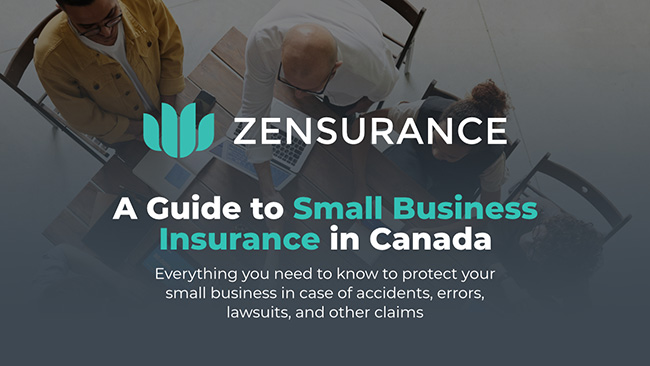We’re in a tough economic climate right now. Although inflation isn’t as high as a year ago, it remains troublesome as it reduces our purchasing power, creates financial planning challenges, and triggers high interest rates that strain personal budgets.
It’s also led thousands of Canadians to explore options to supplement their incomes by freelancing outside their usual employment, launching a home-based business, or taking on a side hustle. According to one survey, 28% of Canadians are taking on side hustle jobs, up from 13% in 2022.
But surviving in a tight economy or getting ahead financially requires more than launching a side hustle. It also requires protecting your finances. That’s why insurance for side hustles or side gigs is imperative – it protects your finances and reputation from expensive liability, damage and loss claims.

Related Posts
Sign Up for ZenMail
"*" indicates required fields
Categories
8 Reasons Why Getting Insurance to Cover Your Side Hustle Matters
Here are eight reasons why you should consider insuring your side hustle or gig:
1. Legal Protection
Business liability insurance provides legal protection if you’re sued for property damage or bodily injury claims related to your side hustle. Without it, you could be personally responsible for legal fees and any settlement or judgment, especially if you’re a sole proprietor, since that designation isn’t a separate legal entity between your personal and business assets. That leads to our next point.
2. Financial Security
Insurance protects your personal finances. Without insurance, you may have to pay for legal costs and potential settlements out of pocket. Those expenses aren’t cheap and can be financially devastating.
3. Professionalism and Credibility
Being insured demonstrates professionalism and can instill confidence in your customers. It shows that you take your side hustle seriously and are committed to protecting their interests.
4. Contractual Requirements
Some of your customers or partners may require you to have liability insurance to do business with them. It’s a common requirement for many business contracts.
5. Coverage for Accidents and Mistakes
Even with the best intentions, accidents and mistakes can happen. Insurance provides coverage for incidents like third-party property damage or third-party bodily injuries caused by your activities.
6. Peace of Mind
Knowing you’re covered if something goes wrong provides peace of mind and allows you to focus on making money without constantly worrying about potential legal and financial risks.
7. Compliance with Legal Requirements
Depending on your location and the nature of your side hustle, there may be legal requirements or industry regulations that mandate you carry a specific amount of liability insurance.
8. Protection for Your Personal Assets
Business insurance separates your personal assets from your side hustle. Without it, your savings, home, or other assets could be at risk if you’re sued.
What Insurance Do You Need for a Side Hustle?
There are different types of coverage in every business insurance policy. What coverages and coverage limits your policy should have depends on what you do.
For instance, if you offer dog walking services, and a dog in your care, custody, and control bites a passerby, you can be held liable for the injured person’s medical expenses and other damages they suffer. Or, if you sell products online part-time through Amazon or Etsy, and an item you sell to someone harms them or damages their property, they could sue you and hold you financially responsible, even if you didn’t manufacture the product.
Insurance for side hustles may include:
- General liability insurance covers third-party bodily injury or property damage claims.
- Contractual liability insurance can cover the liabilities you face when signing a contract with a customer or business partner that indemnifies them and places financial responsibility on you to pay for any third-party bodily injuries or property damages that occur during your work.
- Professional liability insurance is necessary if you offer advice or services to customers, such as a business consultant does. If you’re accused of professional negligence, making mistakes, or failing to provide a service as promised, you can be held liable.
- Product liability insurance is vital if you manufacture, distribute, or sell products online or offline (like at a farmers’ market). It covers your expenses if a product you made or sold to someone hurts them physically or damages their property.
- Most side hustlers have a website, use email and social media to interact with their customers, and may also have a point-of-sale (POS) system to accept digital payments. Cyber liability insurance is critical to cover your expenses and help you recover if your site is hacked and your customers’ confidential information is stolen or compromised.
How to Get Your Side Hustle Covered Fast
Getting the business insurance you need for your side hustle is quick and easy through Zensurance.
Fill out our online application form for a free quote – it only takes a few minutes. Thereafter, our knowledgeable brokers will shop our partner network of over 50 insurance providers to find the low-cost protection you need, customize the policy to suit your requirements, and issue you a certificate of insurance.
Recent Posts
What Is a Deductible in Small Business Insurance? (Definition, Examples & How It Works)
A deductible is the amount your small business pays out of pocket when you file an insurance claim. Understanding how deductibles work can help you lower premiums, avoid surprises, and choose the right coverage.
Why E-Commerce Insurance Matters for Online Sellers in Canada
If you sell products online in Canada, e-commerce insurance – also known as online business insurance – is essential to protect your finances, inventory, and reputation. Here’s what online sellers, dropshippers, and small e-commerce businesses in Canada need to know.
What Happens If Your Small Business Gets Sued in Canada?
Being sued as a small business owner can be financially and emotionally overwhelming. Legal defence costs can quickly climb into the tens of thousands of dollars. This article explains what happens when your business is sued, how business liability insurance can help cover legal fees, and how to reduce your risk of being sued in the first place.









